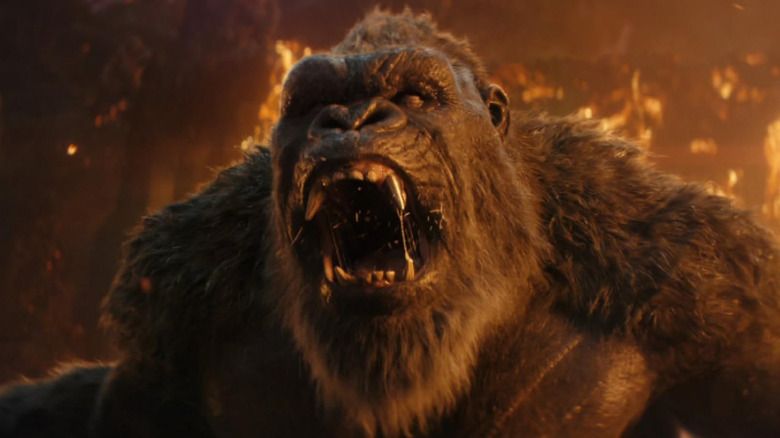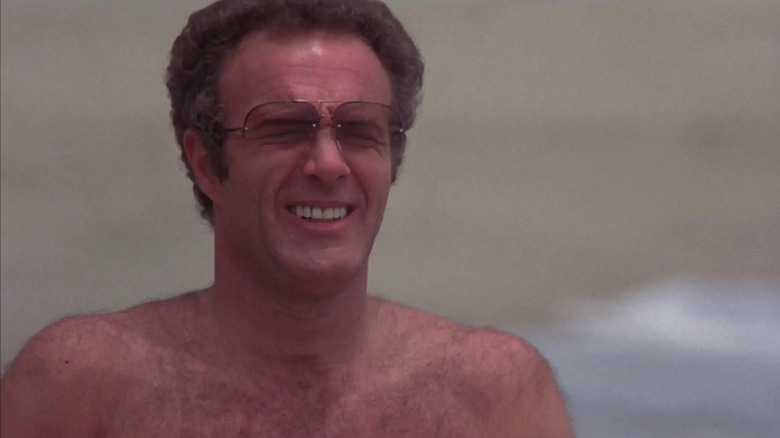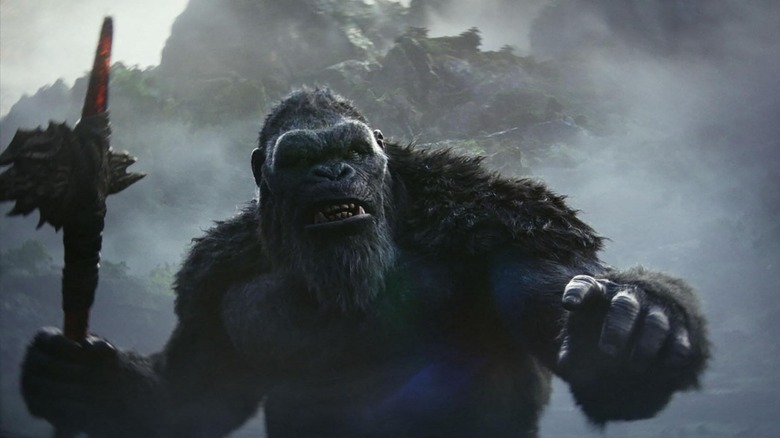Godzilla X Kong's Director Found His Hairy Muse In A Michael Mann Movie
It may be hard to think of the famous King Kong as anything but a giant, scary gorilla, but the character has also always been a metaphor. As Quentin Tarantino had a character point out in one of the best scenes in "Inglourious Basterds," Kong's basic story is a clear parallel for the plight of enslaved people taken to the U.S.
That might sound like a progressive allegory, as the chaos Kong wreaks on New York could be seen as karmic justice for the U.S.' history of racism and slavery, but the execution was pretty questionable. There've been decades of debate over whether Kong's story is a critique of racism or an endorsement of it. "This is, again, a big, Black man — right? — a big, black ape who is absolutely obsessed with whiteness and particularly white women," said media studies professor Robin R. Means Coleman in a 2017 NPR interview. "That's the low-hanging fruit of Black metaphors."
In recent interpretations, however, there's been an effort to detangle the racial aspects of the character. 2017's "Kong: Skull Island" featured a far more diverse cast in general, which helped make any racial connotations of Kong's story fade into the background. Likewise, the upcoming "Godzilla x Kong: The New Empire" doesn't seem to have any interest at all in commenting on Black masculinity and the way it's perceived. As director Adam Wingard explained to SFX magazine, he's just interested in commenting on masculinity in general:
"Kong really is the last masculine hero in movies. They just don't make them like that any more. A big influence on me from that perspective is one of my favorite films, Michael Mann's 'Thief.' James Caan's performance is one of the best performances I've ever seen."
An '80s icon
That's right: the inspiration for the latest iteration of King Kong has nothing to do with race in America, and everything to do with that handsome James Caan. "[Caan gives] the most masculine performance, I feel, in film history," Wingard continued, referring specifically to Caan's role in Michael Mann's 1981 flick "Thief." "He's got his hairy chest, his hairy arms, and all that, and he's just such a badass."
The hairiness in particular is notable because, for a while now, male body hair has been strangely missing from most intentionally attractive male characters. At some point, Hollywood decided that body hair is gross even on men and that back hair in particular is hideous. It's why Vulture wrote a whole celebratory article about Seth Rogen daring to show his back hair in his 2014 comedy "Neighbors," and even then the movie was still sort of making a joke about how old and unattractive Rogen's character was compared to his college-aged rival (played by Zac Efron). It's also why we here at /Film dedicated an article to Henry Cavill's decision to not shave his chest for "Man of Steel." These examples are so rare that when they do happen, they make the news.
Meanwhile, back in the '80s, Caan in "Thief" was unabashedly hairy, shoulders and back included, and this was unremarkable. It certainly didn't stop Mann from portraying him as a pretty cool and handsome guy. It's the sort of treatment that really underlines just how much Hollywood beauty standards have changed over the decades; nowadays, if you're looking for a mainstream relatable hairy male character to get behind, Adam Wingard's King Kong is probably as good as you're gonna get.
Kong's sensitive side
Of course, it wasn't just the body hair that caught Wingard's attention, but the way Caan's character Frank had a softer side to him beneath the tough-guy veneer. "At the end of the day what really defines him, what makes him feel truly masculine, is the fact that he's also in touch with the sensitive side to him," Wingard explained. "He wants to have a kid, and it's his relationship with the woman that you really remember."
Likewise, as much as he's famous for climbing up buildings and throwing humans around like ragdolls, ultimately Kong is best known for his surprisingly sweet, tender relationship with Ann Darrow. It's so wholesome that "The Simpsons" went out of its way to give the two a happy ending in the show's "Treehouse of Horror" parody of the 1933 "King Kong," even as it kept in all the other horrific deaths. As dangerous as Kong is, at the end of the day he's just a lonely bloke who struggles to find love in a cold, chaotic world, no different from poor Frank. As Wingard put it:
"He's masculine because he's a sensitive guy. [...] In this film it's all about his loneliness and him wanting to find others. We played with that in the last movie, his relationship with this little girl, Jia. What really, truly brings out what makes Kong such an interesting, very macho character is the sensitivity he can have as well."
"Godzilla x Kong: The New Empire" is out in theaters on March 29, 2024.


